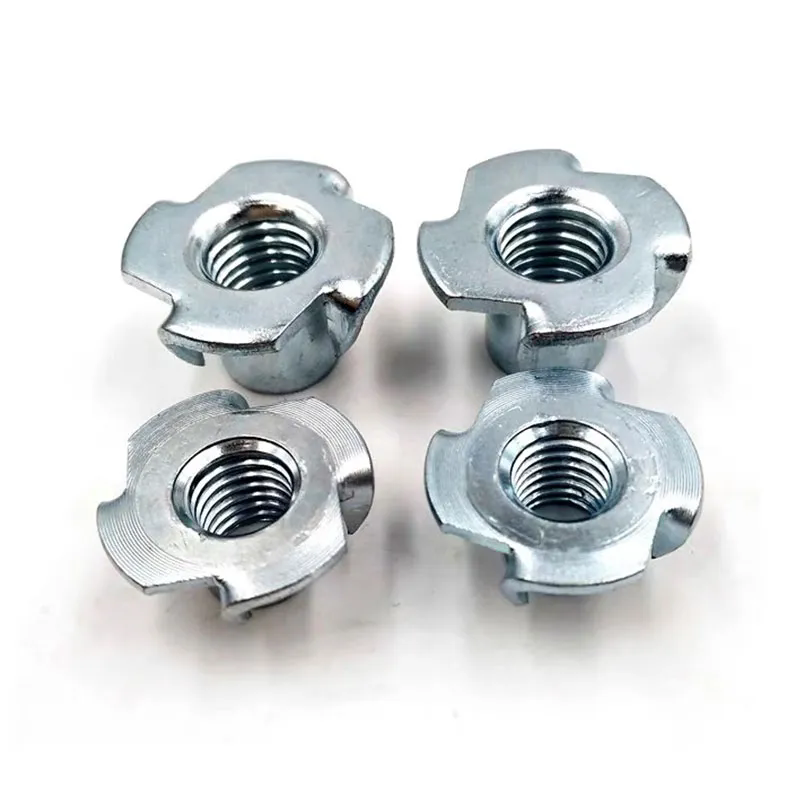Understanding Four-Jaw Nuts: Your Questions Answered
2024-11-05
Four-jaw nuts are specialized fasteners commonly used in various industrial applications. Their unique design and functionality make them essential for specific tasks. In this blog, we’ll answer some frequently asked questions about four-jaw nuts to help you understand their purpose, benefits, and applications.
What is a four-jaw nut?
A four-jaw nut is a type of fastening device that features four distinct jaws or prongs, allowing for secure clamping of components in place. Unlike traditional nuts, which have a hexagonal shape and fit onto a bolt, four-jaw nuts provide a more versatile grip. They can accommodate different shapes and sizes of workpieces, making them suitable for a variety of industrial applications.
What are the key features of four-jaw nuts?
Four-jaw nuts come with several important features:
1. Versatile Clamping: The four-jaw design allows for the secure grip of irregularly shaped workpieces, making them ideal for machining and manufacturing.
2. Adjustable Jaw Positions: Many four-jaw nuts feature adjustable jaws, enabling users to customize the fit for different sizes and shapes of materials.
3. Stability: The four-jaw configuration provides better stability and balance during machining processes, reducing the risk of workpiece movement.
4. Durability: Made from high-strength materials, four-jaw nuts are designed to withstand heavy loads and rigorous use in industrial settings.
What are the common applications of four-jaw nuts?
Four-jaw nuts are used in various applications, including:
1. Machining: In CNC machines and lathes, four-jaw nuts are employed to securely hold workpieces during cutting and shaping processes.
2. Metal Fabrication: They are used in welding and assembly operations where precise alignment is required.
3. Automotive: In automotive manufacturing, four-jaw nuts may be used to hold components together during assembly.
4. Construction: They can be utilized in building frameworks and structures where strong, reliable fastening is necessary.
How do four-jaw nuts compare to other types of fasteners?
When compared to other fasteners, such as standard hex nuts or locking nuts, four-jaw nuts offer distinct advantages:
- Grip: Four-jaw nuts provide a more secure grip on irregular shapes, while standard nuts may slip off or fail to hold certain components securely.
- Flexibility: The adjustable jaws of four-jaw nuts allow for greater flexibility in accommodating various workpiece sizes and shapes.
- Stability: Four-jaw nuts enhance stability during machining, reducing vibration and movement, which can lead to precision errors.
Are there any specific tools required for installing four-jaw nuts?
Installing four-jaw nuts typically requires basic tools such as wrenches or pliers to tighten or loosen the nuts. In some cases, specialized fixtures may be needed to align the jaws correctly before tightening. It's essential to follow the manufacturer's guidelines for installation to ensure proper functionality and safety.
What materials are four-jaw nuts made from?
Four-jaw nuts are commonly made from various materials, including:
1. Steel: High-carbon steel is frequently used for its strength and durability.
2. Stainless Steel: For applications requiring corrosion resistance, stainless steel four-jaw nuts are an excellent choice.
3. Aluminum: In lightweight applications, aluminum may be used for its reduced weight while still providing adequate strength.
4. Plastic: In some cases, high-strength plastics are utilized for non-metal applications where weight is a concern.
How do I choose the right four-jaw nut for my application?
To select the appropriate four-jaw nut, consider the following factors:
1. Material Compatibility: Ensure the material of the four-jaw nut is suitable for your application, especially if it will be exposed to harsh environments.
2. Load Requirements: Determine the load capacity needed for your application to choose a nut that can handle the expected forces.
3. Workpiece Shape and Size: Assess the shapes and sizes of the workpieces to ensure the four-jaw nut can accommodate them effectively.
4. Installation Tools: Consider the tools you have available for installation and whether additional fixtures are needed for your specific setup.
Conclusion:
Four-jaw nuts are essential fasteners in various industrial applications, offering versatility, stability, and strong clamping capabilities. By understanding their features, benefits, and appropriate usage, you can make informed decisions for your projects. Whether you are machining, fabricating, or assembling components, incorporating four-jaw nuts can enhance your work's efficiency and reliability.



